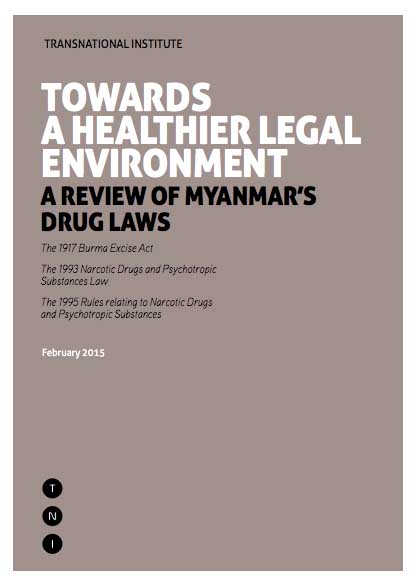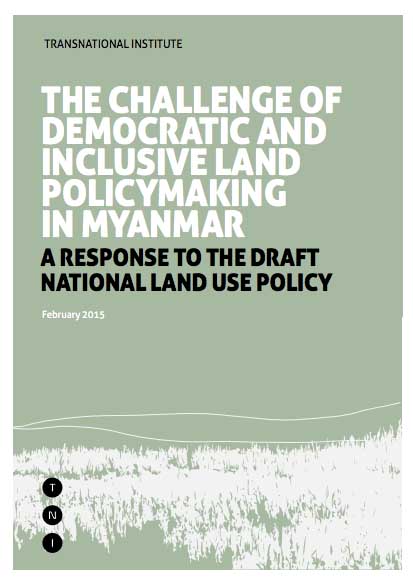Law (179 found)
Advance Unedited Version: Report of the Special Rapporteur on the situation of human rights in Myanmar, Yanghee LEE
Since 2011, Myanmar has undergone far-reaching changes that have affected many aspects of life in the country. However, there continue to be signs of backtracking by the Government and increasing concerns over discrimination and ethnic conflict […]
• • •Amnesty International Annual Report – Myanmar Chapter
Despite ongoing political, legal and economic reforms, progress on human rights stalled, with some backward steps in key areas. The situation of the Rohingya deteriorated, with ongoing discrimination in law and practice exacerbated by a dire humanitarian situation. Anti-Muslim violence persisted, with the authorities failing to hold suspected perpetrators to account. Reports of abuses of international human rights and humanitarian law in areas of armed conflict persisted. Freedoms of expression and peaceful assembly remained severely restricted, with scores of human rights defenders, journalists and political activists arrested and imprisoned. Impunity persisted for past crimes […]
• • •Transnational Institute: Towards a Healthier Legal Environment – A Review of Myanmar’s Drug Laws
 This report reviews Myanmar’s drug laws and related policies, including the 1917 Burma Excise Act; the 1993 Narcotic Drugs and Psychotropic Substances Law; and the 1995 Rules relating to Narcotic Drugs and Psychotropic Substances. Since these laws were enacted several important changes have taken place inside and outside of Myanmar […]
This report reviews Myanmar’s drug laws and related policies, including the 1917 Burma Excise Act; the 1993 Narcotic Drugs and Psychotropic Substances Law; and the 1995 Rules relating to Narcotic Drugs and Psychotropic Substances. Since these laws were enacted several important changes have taken place inside and outside of Myanmar […]
The Challenge of Democratic and Inclusive Land Policymaking in Myanmar: A Response to the Draft National Land Use Policy
 In October 2014 the Myanmar government unveiled a draft National Land Use Policy (NLUP) and announced it would take public comments for a limited time before finalizing the document. Once it is finalized, the new policy will determine the distribution, use and management of the country’s land and related natural resources like forests and rivers, for years to come […]
In October 2014 the Myanmar government unveiled a draft National Land Use Policy (NLUP) and announced it would take public comments for a limited time before finalizing the document. Once it is finalized, the new policy will determine the distribution, use and management of the country’s land and related natural resources like forests and rivers, for years to come […]
WORLD REPORT 2015
Burma
The reform process in Burma experienced significant slowdowns and in some cases reversals of basic freedoms and democratic progress in 2014. The government continued to pass laws with significant human rights limitations, failed to address calls for constitutional reform ahead of the 2015 elections, and increased arrests of peaceful critics, including land protesters and journalists […]
• • •A Briefing by Burmese Rohingya Organization UK: International Investigation Urgently Needed into Human Rights Abuses Against the Rohingya
The Rohingya Muslim minority in Burma are the most persecuted ethnic minority in Burma, subject to policies of oppression which are applied almost exclusively to them. Government policies target Rohingya on the basis of their ethnicity and religion. The Rohingya are widely viewed in Burma as illegal immigrants from Bangladesh, despite the fact that Rohingya people have lived in Burma for centuries […]
• • •Statement of civil society organization on students’ actions against National Education Law following the overdue 60-day deadline for negotiation
Education sector reform during transition period is very important and vital for the future of Myanmar
The 60-day period for negotiation declared by students has passed and students have resumed their protest activities against the National Education Law. Student from Mandalay have begun their march from Mandalay to Yangon on the 20 January while students from other parts of the country have carried out their protest activities in their respective areas as well […]
Statement (1/2015)
Action Committee for Non-violence and Justice, comprised of representatives from various youth organizations and networks, was formed in response various crisis that Myanmar is encountering in today’s process of reform […]
• • •Myanmar 2014: Civic Knowledge and Values in a Changing Society
 After decades of military rule and isolation, a new Asia Foundation survey shows Myanmar’s citizens are hopeful about the future – on elections, respondents say they believe in exercising their right to vote: 77 percent say that voting can lead to improvements in the future, just 10 percent say things will not change no matter how one votes. But this optimism is tempered by challenges that remain. The findings reveal limited knowledge among the public about government institutions and their functions, low level of social trust, a high degree of political polarization, and deep apprehension about economic opportunities.
After decades of military rule and isolation, a new Asia Foundation survey shows Myanmar’s citizens are hopeful about the future – on elections, respondents say they believe in exercising their right to vote: 77 percent say that voting can lead to improvements in the future, just 10 percent say things will not change no matter how one votes. But this optimism is tempered by challenges that remain. The findings reveal limited knowledge among the public about government institutions and their functions, low level of social trust, a high degree of political polarization, and deep apprehension about economic opportunities.
Myanmar: Constitutional Reform, A Crucial Step in the Transition to A More Democratic Nation
GENEVA (23 May 2014) – The United Nations Special Rapporteur on the human rights situation in Myanmar, Tomás Ojea Quintana, today called on Myanmar to press forward with the on-going process of constitutional reform[…]
• • •
 All posts
All posts